- Home
- Jeanne DuPrau
Car Trouble Page 4
Car Trouble Read online
Page 4
“Old engines,” said Stu. “They don’t burn clean.”
“But that doesn’t mean we’re going to break down or anything,” said Duff.
“No, no. Just a little stink.” Stu propped his feet on the dashboard. His knees stuck up in front of his face, which was halfway down the seat. He said, “So what do you do with yourself, Mr. Duffy, when you’re not out driving?”
“I work on my projects, mostly.”
“On your computer?”
“Correct.”
“Like what would a typical project be?”
“Well, right now I’m working on a virus detector for incoming email files, and also a really good RAM optimizer.”
“Uh-huh,” said Stu. “So that’s what you do all the time? Morning, afternoon, and night?”
“Pretty much. This stuff is nontrivial. You have to know a lot.”
“Yeah, but don’t you get restless, man? Sitting in the same old room all day, staring at that same old screen? Don’t you want to have some fun ever?”
“My projects are fun, to me,” Duff said. “I’ve designed some games, too. Spitballs from Hell is my best one.” He felt a surge of pleasure just thinking about that awesome game. “I designed a slick interface for it,” he said, “and I got it to go incredibly fast by using this algorithm I developed pretty much on my own. And the graphics weren’t even too shabby, considering I’m not exactly an artist.” Duff grinned, remembering how clever he’d been. “See, the game has eleven levels,” he said, and he would have gone on to explain the whole thing if he hadn’t glanced over at Stu and seen him shaking his head in a slow and mystified way.
“Whatever turns you on,” Stu said. “See, what you like and what I like aren’t the same. What I like is to find a girl who knows how to have a good time, and then we take the boom box down to the beach and have a picnic. Or we go dancing. A girl who laughs a lot, that’s the kind I like.”
Not me, thought Duff, remembering April Parmalee back in high school, a big laugher. She liked to make other people laugh, too. She often got good laughs by talking in a goofy, hooting way that was supposed to be an imitation of Duff. Very funny.
Stu turned toward Duff, hooking his elbow over the seat back. “You have a girlfriend, man?”
“No,” said Duff shortly. He felt wounded by Stu’s lack of interest in his game. “I don’t really have time for girls.”
“Because you work on your computer all the time?”
“Most of the time.”
“But how come the girls aren’t after you, man? You’re a big tall guy, they like that. You’d be good-looking if you did something different to your hair. And if you didn’t look so freakin’ serious.”
“I can’t help looking serious,” said Duff. “I am serious. I am just not interested in wasting my time doing pointless stuff like sitting on the beach with some girl.”
“Maybe you’re gay,” said Stu.
“No,” said Duff. “I am not.”
“Some people are and don’t know it,” said Stu.
Duff had never understood how people could not know what sex they were attracted to. It was just there inside you, a magnetic pull. He had felt it, strongly, twice: for Melissa Nimberger in eighth grade, and for Megan Bent his junior year. He’d never felt it for a boy, but he imagined that kids who had would know it perfectly well. How could you not?
“I’m trying to tell you,” he said to Stu. “It’s not that I don’t like girls, I just don’t have time for them right now.” He knew of course that this wasn’t true. If, for instance, Megan Bent had knocked on the door of his parents’ house some night and asked to see him, he would have leaped up from his important project and wasted as many hours with her as she wanted. The problem wasn’t that he didn’t like girls, it was that girls didn’t like him. Or didn’t notice him. Or noticed him in the wrong way.
Stu appeared to lose interest in the conversation after that. He took a couple of sticks of gum out of his pocket, unwrapped them, and threw the wrappers out the window. “Gum?” he said to Duff.
“No, thanks.” Duff didn’t go for littering. Why mess up the highway even more than it was messed up already, with billboards and abandoned tires and squashed animals? But he didn’t say this to Stu. He didn’t feel like talking to Stu at the moment.
Stu chewed for a while, gazing out the window, and then his head gradually tilted sideways until it was resting against the glass, and he went to sleep. His mouth dropped open, showing the wad of gum stuck to a lower tooth. Occasionally his leg twitched, and he made little muttering sounds.
Duff drove, brooding about his social life. It was as if he had an unresolved bug in his personality program, a bad line of code that caused him, whenever a girl spoke to him, to split into two people. One was The Speaker, who said something in reply to the girl, and the other was The Listener, who told him how asinine what he had just said was and suggested several other things that would have been better. This had been going on for years. He was afraid he was doomed to be chewed out by The Listener for the rest of his life, which would mean he would never have a normal conversation with a girl, because he would be too distracted by The Listener’s constant criticism.
He brought his thoughts back to the present. Better check those dashboard gauges and make sure everything was all right. Nothing was flashing. But the needle of the gas gauge was pointing almost directly to the “E.” How could they have used up a whole tank of gas already? Of course, maybe Carl hadn’t started them out with a full tank. He’d forgotten to check.
Duff poked Stu, who woke up with a start. “We’re stopping for gas,” Duff said. He took the next exit and found a gas station. A cheerful-looking man wearing a blue shirt with PHIL embroidered on the pocket flap watched as they drove in. He looked over the car admiringly. “This is a nice old baby,” he said. “You’ve definitely got a problem with your emissions, though. Your exhaust is spewing out a good number of noxious chemicals.”
“Oh,” said Duff. “Like what?”
“Oh, stuff like carbon monoxide. That’s the one people pump into the car when they want to commit suicide. Also hydrocarbons that tend to wreck the atmosphere of the planet. Little problems like that.”
“Can you fix it?”
“Well, I’d have to take the engine apart to see why it isn’t burning clean. Probably take me at least two or three days.”
“That’s no good,” said Duff. “We have to be in St. Louis by tonight.”
Phil shrugged and grinned and held his hands out sideways, palms up. “Can’t help you, then,” he said.
They filled up the tank. Duff watched the numbers scroll by on the gas pump. “How many miles per gallon does a car like this get?” he asked Phil.
“Oh, these old cars get maybe twelve or fourteen miles a gallon,” said Phil.
“Not too good,” said Duff.
“Yep. It’s terrible. Your newer cars, now, especially those hybrids, they can get forty or fifty or even more. Except for the big SUVs, of course, which don’t do much better than this old thing.”
Duff did a quick mental calculation. Every twelve miles he’d be paying for a gallon of gas. Between here and San Jose was something like 2500 miles. Divide 12 into that, multiply by the price of gas—Duff let out a quiet whistle. It was a significant sum.
“So why would anyone these days want to drive a car like this?” he asked. “And pay two or three times as much for gas?”
“Because it’s cool, man, it’s cool!” Stu spit on his finger and rubbed a little dab of bird poop off the hood.
It was true, Duff knew it: people would pay a lot to be cool. He himself, though he ordinarily looked down on people who worried about coolness, had enjoyed the admiring looks the car attracted.
But not enough to want to own the thing. As they drove away from the gas station, Duff allowed his eyes to flick to the rearview mirror every now and then. A blackish haze was still drifting from the end of the car. Behind him, other cars dropped back or
passed him so they wouldn’t be in its path. They rolled up their windows. Driving this car made Duff feel cool on the one hand and like a criminal on the other. Weren’t there cars that ran on electricity? Or hydrogen, or something? He’d heard of cars like this, vaguely, but never seen one. Probably they weren’t cool at all.
He sighed. He stretched out his left leg and straightened up in the seat. His muscles were getting stiff from sitting so long in the same position. They were approaching the outskirts of Louisville, Kentucky, now. More cars were on the road. It was nearly seven o’clock.
“How long till we get to St. Louis?” Stu asked.
“Maybe four hours.”
“Well, let’s have some dinner pretty soon, then. I’m starving.”
They got off the highway and looked for a place to eat. There wasn’t much. Finally they saw a hand-painted sign that read PETE’S STEWPOT, 5 MILES AHEAD—DOWN HOME COOKING.
“That sounds all right,” Stu said.
But when they got there, the place didn’t look inviting. It was a low, windowless brick building with a herd of motorcycles parked outside, their shiny black bodies glinting in the light from a neon beer sign on the wall. Duff hesitated.
“Let’s go,” said Stu, slinging his backpack over his shoulders and climbing out of the car.
Duff was hungry, so he followed.
Chapter 6
THE BIKERS’ DANCE
Inside Pete’s Stewpot it was so dark that they had to stand at the doorway for a minute to let their eyes adjust. The place seemed to be full of people, not sitting quietly in small groups at separate tables but roaming all around the room, calling out to one another, moving from one table to another. Someone was laughing a deep rumbling laugh. Loud music was playing. Duff realized that all these people were wearing either black leather jackets decorated with studs and chains or black T-shirts that said EAT MY DUST on the back. Most of them were men. A few were girls. “Bikers,” said Stu.
“Maybe we should try somewhere else,” said Duff.
“There isn’t anywhere else. I’m hungry. They won’t bother us.”
A large blond woman with a double chin emerged from the darkness and led them to a table back by the kitchen door. “Don’t mind this crowd,” she said. “They act tough but they’re all right.”
Duff wasn’t sure about that. From painful personal experience, he knew that people like himself were tempting targets for people like these. The tougher they acted, the more pleasure they seemed to get out of persecuting defenseless computer geniuses. He put his menu up in front of his face and hunkered down low in his chair.
The bikers stared at them, sizing them up. A guy with a red bandanna tied around his forehead walked past their table and said, “How ya doin’?” in a way that didn’t seem entirely friendly. The music stopped for a moment, and in the sudden quiet they heard someone give the punch line of a rowdy joke, and someone else said, “Hey, Sluggo, don’t be crude, we got some nice boys in here tonight.” Everyone in the room looked over at them. Duff concentrated on the menu.
The large blond woman reappeared and jotted down their order—spaghetti for Stu, a tuna sandwich for Duff. Duff read the name on her badge—KAY—and thought of his mother. If she could see him right now, having dinner in a biker hangout with a hitchhiker, she wouldn’t be pleased.
“I’d like to have one of those big roadhog bikes some day,” said Stu.
“Do they cost a lot?”
“Oh, yeah. I’d have to save up. But I ought to be able to get a good job in San Diego. That’s where I’m headed. I can live with this buddy of mine for a while, so I won’t have to pay rent.”
“How come you’re going all the way to California to get a job?” Duff said. “You could work on cars anywhere. You could get a job at home.”
Stu held up his hands as if warding off a blow. “Oh, no,” he said. “Oh, no no no. Not at home with the mom and dad, no thank you. I aim to put a whole continent between me and them.”
“Why?”
“Because, man. They want to chain me up! They wanted me to join the military, if you can believe that. Can you picture it? Me marching along in some kind of formation, wearing a uniform, with my hair all buzzed off?”
Duff shook his head. He couldn’t picture it. “Why’d they want you to do that? Were you getting in trouble or something?”
Their food arrived, and Stu became very involved in sprinkling cheese on his spaghetti and wrapping strands of pasta around his fork. He seemed to have forgotten Duff’s question, so Duff asked it again. He thought he deserved to know. “Were you getting in trouble?” he said.
Stu flapped his hand back and forth as if shooing away a fly. “Little stuff. Nothing major. People overreact.” He took a big mouthful of spaghetti, shlooping up the dangling strands. “Hey, look what’s going on,” he said.
The music was blasting forth again, and a couple of the girls had started dancing. They weren’t dancing with anyone, they just stepped out between the tables and waggled their hips and pumped their elbows back and forth. Whistles and catcalls came from the men. This went on for quite a while. It was too noisy to talk. Duff finished his sandwich; Stu scraped up the last of his spaghetti sauce with a piece of bread. “Let’s go,” said Stu.
Duff was standing at the counter, paying the bill, when he felt a tap on his shoulder. He turned around. A girl with purple eye shadow and ink-black hair was standing behind him. She smiled. “Hey, nice boy,” she said. “Come on and dance with me.”
“Oh, uh, no thanks,” Duff said. “We were just leaving.…”
The girl put on a hurt expression. She grabbed his arm. “Come on,” she said. “Just one little dance.”
“No, really, we have to go.” Duff pulled away. He had to get out of here.
“Anyway, he doesn’t know how to dance,” said Stu. “Otherwise, I’m sure he’d be delighted—”
A hand clamped onto Duff’s shoulder. He spun around. The man with the bandanna was standing over him, scowling. “Boy,” he said, “when my lady wants to dance with you, you dance.”
What followed was about the worst five minutes in Duff’s entire life so far. He was hauled out into the middle of the crowded room, where he wriggled wretchedly, humiliated down to his bones, while the girl flounced around him and the circle of bikers roared and jeered. When the music ended, the girl blew him a kiss, and Duff made a wild dash for the door and stumbled out into the parking lot. “Over here,” called Stu, who was in the driver’s seat of the car. Duff climbed in, breathing hard.
“Give me the keys, I’ll drive,” Stu said. Duff handed them over, and Stu hit the gas.
After a few miles, when he had more or less stopped shaking, Duff said, “Barbarians. Troglodytes. Neanderthals.”
“Maybe,” said Stu. “But you know, man, it’s better if you lighten up around it. When you let them get to you, they get meaner. You gotta just laugh.”
Duff scowled. Why should people who were dumb and mean have so much power over people who were smart and decent? What was it about him that made people like jocks and bikers want to pounce on him, as if they were wolves and he were a rabbit? Did he look like a rabbit? No. Did he act like a rabbit? No. He just wanted to be left alone to be his own slightly unusual self. What was so wrong with that?
Stu flicked on the radio, which was playing something with a lot of doo-wops in it. “That’s enough oldies,” Stu said. “Let’s get up to date.” He spun the radio dial with a practiced hand, passing over a talk show (“If you think I would ever let my child see a movie like that, then you—”), and a news report (“…on their way to clean up oil-soaked birds after a major spill off the coast of—”), and in a second he’d tuned in some fast, loud music with a pounding beat. He snapped his head back and forth in time to the rhythm and jerked his elbows around. “I love this one, man,” he said. He joined in with it, shouting the words.
Duff stared straight ahead. He was not in the mood for music, especially music like this, which
made him anxious. It reminded him of the one time he’d gone to a high school dance, which he only did because Kelly McMartin, who lived down the street from him and was in his calculus class, asked him to. When the music started up, and kids began to twitch and shuffle and bump against each other, a feeling of terror came over Duff. He didn’t know how to do that twitching. He didn’t want to do it. Fortunately, Kelly didn’t seem set on doing it, either, so they sat near the drinks table most of the evening and, in the moments when the music stopped, he entertained her by explaining an interesting command structure he’d developed for his latest project.
“Don’t you like this song?” said Stu, noticing Duff’s silence.
“Not really,” said Duff.
“Well, what do you like? I’ll find some of your kind of music.”
“My kind of music isn’t on the radio,” said Duff. “I brought my CDs. You can listen to those if you want to.”
He turned around and groped in the back until he found his CD player and a CD called “Android Troop Loop.” He put the CD in and handed the headphones to Stu.
Stu listened. After about a minute, the corner of his mouth pulled down and his eyes swiveled toward Duff. “What is this?” he said. “It sounds like a bunch of machines screaming at each other.”
“Highly complex computer-generated effects,” said Duff.
“Oh,” said Stu. “I thought you said it was music.”
“It is to me,” said Duff.
Stu took the headphones off. They rode in silence for the next hour or so. Duff started to worry. He worried that he’d have trouble finding Rosalie Hopgood’s house. He worried that they’d be arriving a lot later than they said they would. This morning, when he’d felt so smart and confident, seemed like eons ago. Now everything was going wrong. And Stu—he didn’t know what to think about Stu. Sometimes he was glad he’d picked him up. Sometimes, like right now, he was sorry. If he hadn’t been with Stu, he would have walked right out of Pete’s Stewpot as soon as he walked in.
At last they were approaching St. Louis. Duff saw the lights of the city ahead of them. They came to a bridge over the wide Mississippi River. “We need some money for the toll,” Stu said.

 The Prophet of Yonwood
The Prophet of Yonwood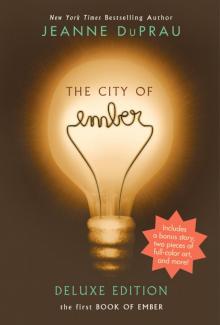 The City of Ember
The City of Ember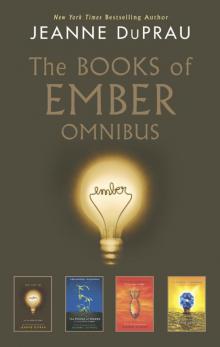 The Books of Ember Omnibus
The Books of Ember Omnibus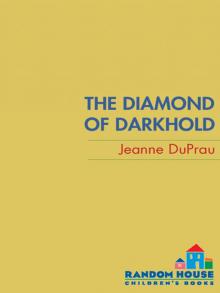 The Diamond of Darkhold
The Diamond of Darkhold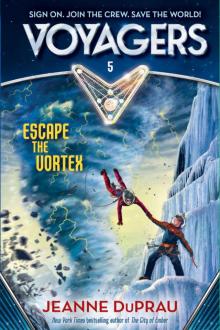 Voyagers: Escape the Vortex (Book 5)
Voyagers: Escape the Vortex (Book 5)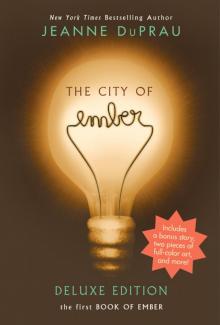 The City of Ember Deluxe Edition
The City of Ember Deluxe Edition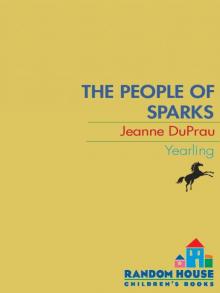 The People of Sparks: The Second Book of Ember (Books of Ember)
The People of Sparks: The Second Book of Ember (Books of Ember)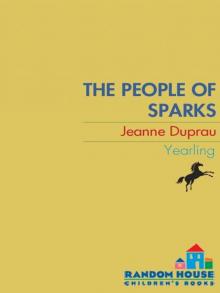 The People of Sparks
The People of Sparks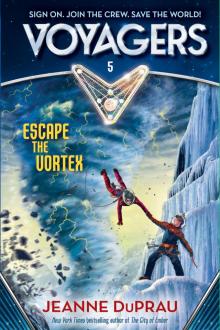 Escape the Vortex
Escape the Vortex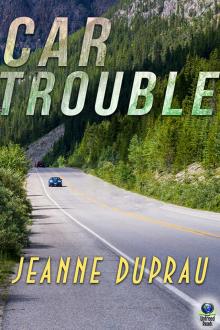 Car Trouble
Car Trouble The City of Ember: The First Book of Ember
The City of Ember: The First Book of Ember